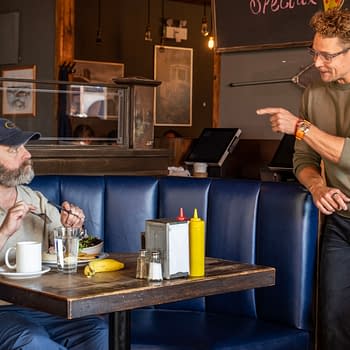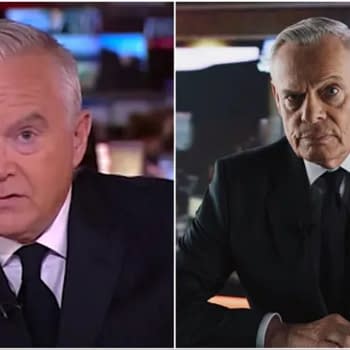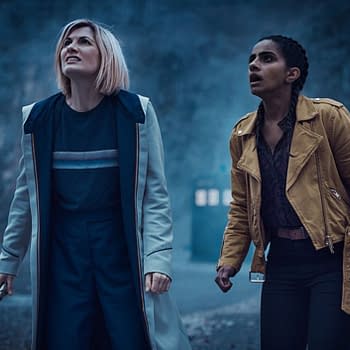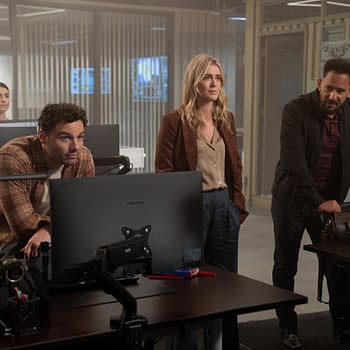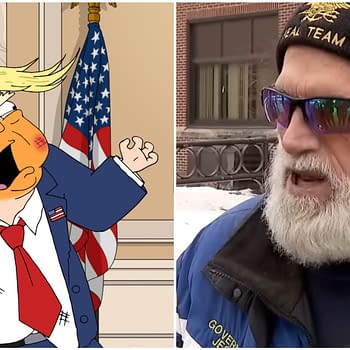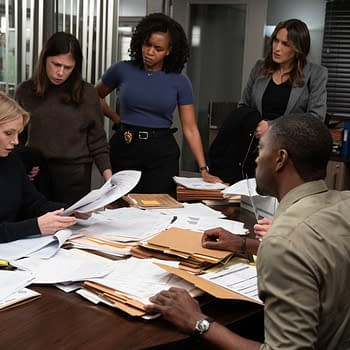Posted in: BBC, Doctor Who, TV | Tagged: bbc, big finish, bleeding cool, cable, colin baker, david tennant, doctor who, matt smith, opinion, russell t davies, science fiction, steven moffat, streaming, sylvester mccoy, television, tom baker, tv, Whoniverse
Doctor Who: The Rise and Premature Fall of the TV Whoniverse
Writer and showrunner Russell T. Davies talked this week about the value of a Doctor Who universe for the BBC consisting of multiple shows and titles in the wake of the Marvel Cinematic Universe, which is the biggest pop culture movie, television, and multimedia franchise in the world. This is more than just fun pop culture. This is worth a lot of money. It's good business. And Davies would know. He actually ran a version of the Whoniverse back when he was the showrunner for Doctor Who and created two spinoffs that ran while the show was at its start and peak of its popularity. There was also a slight attempt during Steven Moffat's time with the spinoff Class.
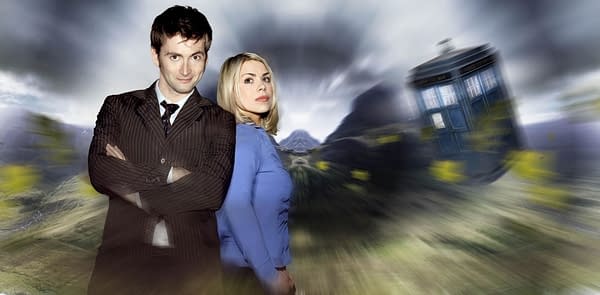
So what happened to the spinoffs that came and went? It's been a while. Let's take a walk down memory lane.
Torchwood
Torchwood was the first in-continuity Doctor Who spinoff and still the most popular. Fans still wish the show had continued. It was the first – and so far, only – overtly adult-oriented spinoff and a properly adult Science Fiction show on British television. It had Rated 15 preoccupations: nasty, bloody violence, sexual situations and relationships (which it sometimes oversold) and darker, more downbeat themes including the heroes failing in contrast to the brighter optimism of the Doctor's stories, though the mothership show and the Doctor himself had plenty of moments of darkness and failure.
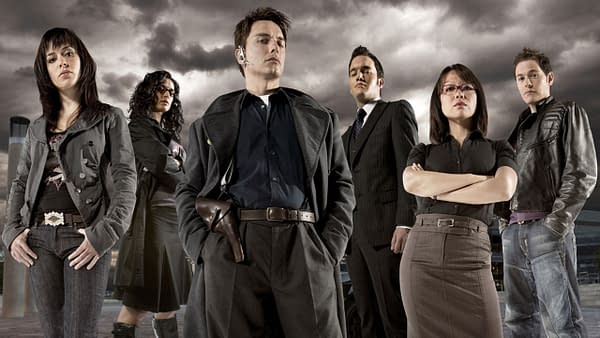
Davies, the show's creator, seemed impatient and restless with the show. It could have carried on for at least three more seasons with its basic case-of-the-week format but after just two seasons, he blew up the entire format, killed off most of the cast, destroyed their headquarters to deliver an angry political parable in the third series, the miniseries Torchwood: Children of Men. Then US cable station Starz signed a deal to co-produce the next season with the BBC and Torchwood: Miracle Day was launched. This season took the show to the US with an American-sized budget and bigger production values with locations in the US and Canada. Torchwood: Miracle Day suffered growing pains with the transition to a US production model with a US-style writers' room and American writers, and the scripts were flawed and the season lost steam. Before the show could continue, Davies' husband became critically ill and he put his career on hold to care for him. Torchwood pretty much ended in 2011. It's still the spinoff show that fans want back. John Barrowman would love it to come back and the surviving cast members probably would too, but Davies, as the creator of the show, seems to have approval and hasn't agreed to a revival.
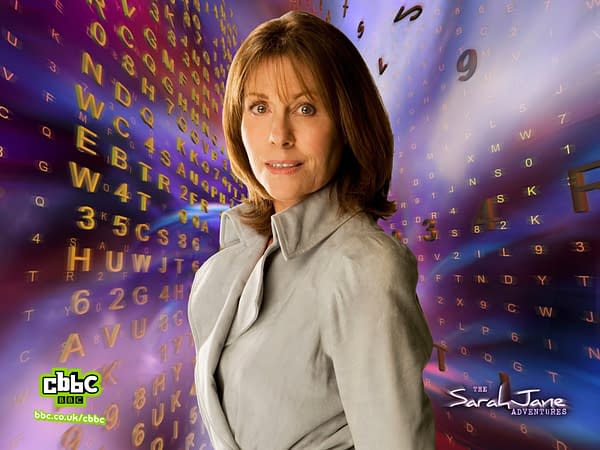
The Sarah Jane Adventures
The Sarah Jane Adventures was the second of Davies' spinoffs, starring Elizabeth Sladen after her return appearance in Davies' second season of Doctor Who. This show skewed to an even younger audience than the mothership show, aiming itself at kids and middle-grade audiences. Its aliens were goofier and the tone was slightly lighter. It lasted three seasons with Davies serving as showrunner even after he ended his stint on Doctor Who. The 10th Doctor (David Tennant) and 11th Doctor (Matt Smith) appeared in the show to tie it to canon if not continuity. This show lasted 5 seasons before it ended due to Elizabeth Sladen's passing.
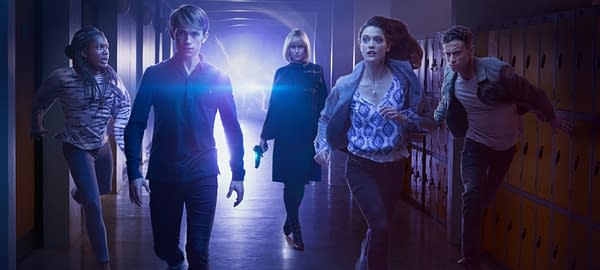
Class
This was an odd, derivative spinoff that nobody really asked for. A Buffy-esque series about high school students fighting alien menaces because their school was over a portal that's basically like Buffy's Hellmouth. The characters didn't appear first in Doctor Who, just introduced in a pilot where the 12th Doctor (Peter Capaldi) showed up at the end to establish it was indeed a spinoff. The tone of the show was on the mature end of the Young Adult audience, with YA author and screenwriter Patrick Ness serving as creator and showrunner. It was actually as emotionally and sexually intense as Torchwood but felt too derivative to be essential. It didn't have Davies' overall vision or guiding hand or Moffat's overview. Overall, it felt like a half-hearted attempt at another spinoff. None of the characters had appeared before or were fan favorites like Captain Jack or Sarah Jane. No fans demanded or craved this spinoff. It was canceled after one season due to low ratings.
Doctor Who (or What) is Next?
At the moment, Doctor Who is back down to just the one show. Showrunner Chris Chibnall still keeps up the vibe that other characters' stories were happening outside of the show, including Captain Jack's. There's no sense that the BBC has any plans to expand beyond the show right now. Russell T. Davies is right. There should be a Doctor Who Channel right now. Tennant and Smith are still popular and are interested in appearing in specials and miniseries, as would the rest of the former cast. It's a globally popular brand that makes the BBC over $100 million a year and serves as a cultural ambassador for British culture to the world. But to have a unified Whoniverse with high-quality spinoffs shows, you need a single producer or executive with a coherent vision like the MCU has with Kevin Feige.
The Big Finish audio dramas actually provide a roadmap for how a Whoniverse could run. Ever wanted to see the 10th Doctor (David Tennant) team up with the 4th Doctor (Tom Baker)? A team-up between the 5th (Peter Davison), 6th (Colin Baker), and 7th Doctors (Sylvester McCoy)? Leela (Louise Jameson) and Romana (Lalla Ward) working together on Gallifrey before and during the Time War? Rose Tyler (Billie Piper) hopping between alternate universes in search of the Doctor? Captain Jack (John Barrowman) teaming up with different Doctors? Missy (Michelle Gomez) and multiple incarnations of the Master messing with each other? Past and recent companions meeting up for adventures? Big Finish production has you covered, with the original actors playing their characters to lend it all a taste of authenticity even though the canonicity of the stories is up for debate in a nudge-nudge-wink-wink fashion. The special trailers for the new Blu-ray boxset releases of previous seasons that feature past companions and even past Doctors in the present offer a glimpse of a universe still active. The recent Dalek animated series on the BBC's official Doctor Who YouTube channel is another dip in the waters of spinoffs.
Davies seemed to hint that his passion for Doctor Who hasn't diminished and might be tempted to return to oversee a Whoniverse franchise. Who knows? All it takes is one producer, not a committee, with a single, singular vision and enough freedom to pull it off.



